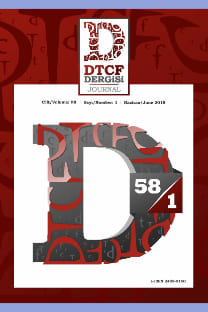FROM SUFFRAGETTE TO DIVERSITY OF VOICES IN FEMINIST DRAMA: PAM GEMS'S DUSA, FISH, STAS AND VI
FEMİNİST TİYATRODA SÜFRAJETTEN ÇOK SESLİLİĞE: PAM GEMS'İN “DUSA”, “FISH”, “STAS AND VI” BAŞLIKLI TİYATRO ESERİ
___
Austin, Gayle. Feminist Theories for Dramatic Criticism. Ann Arbor: U of Michigan, 1995.Castro, Ginette. American Feminism: A Contemporary History. New York: New York UP, 1990.
Chambers, Colin, and Mike Prior. Playwrights' Progress: Patterns of Postwar British Drama. Oxford: Amber Lane, 1987.
Cockin, Katharine. “Women's Suffrage Drama.” The Women's Suffrage Movement: New Feminist Essays. Ed. Maroula Joannou and June Purvis, Manchester: Manchester UP, 1998.
Fortier, Mark. Theory/Theatre: An Introduction. London: Routledge., 1997.
Gems, Pam. “Dusa, Fish, Stas and Vi.” Plays by Women. Ed. Michelene Wandor, Vol I. London; New York: Methuen, 1982.
Gems, Pam. “Imagination and Gender.” On Gender and Writing. (ed.) Michelene Wandor, London: Pandora Press, 1983.
Gems, Pam. "Not in Their Name." The Guardian. N.p. 17 May 2003. Web. 28 Feb. 2018.
Goodman, Lizbeth, and Jane De Gay. Feminist Stages: Interviews with Women in Contemporary British Theatre. London: Routledge, 1996.
Hamilton, Cicely Mary. Marriage as a Trade. Charleston: BiblioBazaar, 2009.
Innes, C. D. Modern British Drama 1890-1990. Cambridge: Cambridge UP, 1992.
Kelly, Katherine E. Modern Drama by Women 1800s-1930s: An International Anthology. London: Routledge, 1996.
Kolmar, Wendy K., and Frances Bartkowski. Feminist Theory: a reader. 2nd ed. New York: McGraw-Hill Companies, 2005.
Landry, Donna, and Gerald M. MacLean. Materialist Feminisms. Cambridge, MA: Blackwell, 1993.
MacSween, Morag. Anorexic Bodies: A Feminist and Sociological Perspective on Anorexia Nervosa. London: Routledge, 1993.
Robins, Elizabeth. “Feministe Movement in England.” Way Stations. N.p. Web. 28 Feb. 2018.
Stowell, Sheila. A Stage of Their Own: Feminist Playwrights of the Suffrage Era. Ann Arbor, MI: U of Michigan, 1992.
Wandor, Michelene. Carry On, Understudies: Theatre and Sexual Politics. London: Routledge & Kegal Paul, 1986.
Wykes, Maggie, and Barrie Gunter. The Media and Body Image: If Looks Could Kill. London: SAGE, 2005.
- ISSN: 0378-2905
- Yayın Aralığı: 2
- Başlangıç: 1942
- Yayıncı: Ankara Üniversitesi Dil ve Tarih-Coğrafya Fakültesi
SERGEY DOVLATOV'UN ESERLERİNDE RETORİK FİGÜRLER
SORUMLULUK ÖLÇEĞİ'NİN PSİKOMETRİK ÖZELLİKLERİNİN DEĞERLENDİRİLMESİ
Burak ÖGE, Faruk GENÇÖZ, Merve TOPCU
BİR BAŞKAHRAMANIN ŞİİRLER ARASI YOLCULUĞU: ZBIGNIEW HERBERT VE “BAY COGİTO”
Elzem NAZLİ, Elif ÖZTABAK AVCI
AIME CESAIRE'İN GÖZÜNDEN KONGO'NUN BAĞIMSIZLIK MÜCADELESİ VE PATRICE LUMUMBA: UNE SAISON AU CONGO
BUDDHİST KÜLTÜRÜN ACANTA MAĞARALARINDAKİ İZLERİ: VİHARALAR
DİL VE MİTOSUN DÜNYASI: KÜLTÜRÜN ARKEOLOJİSİNE İLİŞKİN BİR İNCELEME
